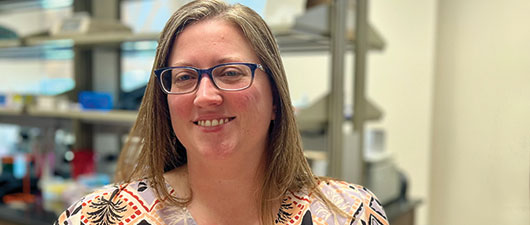 Pictured | Barbara Spinda, EdD, MLS(ASCP)CM SMCM | Program Director and Associate Clinical Professor of Medical Laboratory Science | Indiana University, 2024
Pictured | Barbara Spinda, EdD, MLS(ASCP)CM SMCM | Program Director and Associate Clinical Professor of Medical Laboratory Science | Indiana University, 2024
Division of Medical Laboratory Science
Barbara Spinda, EdD, MLS(ASCP)CM SMCM | Program Director
Vera Z. Dwyer Hall 157 | (574) 520-4568
healthscience.iusb.edu/clinical-laboratory-science/index.html
Faculty
- Program Director | Spinda
- Clinical Associate Professor | Spinda
About the Division of Medical Laboratory Science
The Division of Medical Laboratory Science currently houses the Bachelor of Science in Medical Laboratory Science (MLS) degree which provides the entry-level education needed for employment as a Medical Laboratory Scientist (MLS). The MLS curriculum combines science, medicine, and diagnostic testing to train individuals in clinical chemistry, blood banking, body fluid analysis, hematology, hemostasis, immunology, and microbiology, and laboratory operations. The on campus learning environment is a recently renovated, dedicated classroom and student laboratory at Vera Z. Dwyer Hall.
Graduates are eligible to sit for the American Society for Clinical Pathology Board of Certification (ASCP BOC) or the American Medical Technology (AMT) exam to obtain national certification as a Medical Laboratory Scientist (MLS). Career opportunities include clinical diagnostics in private and public hospitals and reference laboratories, research laboratories, industry research and development, field service operations, regulatory operations, and academia.
The Division of Medical Laboratory Science offers three options to complete the Bachelor of Science in Medical Laboratory Science program.
- Traditional four year bachelor degree.
- Second degree option for individuals with a bachelor degree in biology, chemistry, or other related field.
- Associate in Medical Laboratory Technician (MLT) to MLS degree completion.
Division of Medical Laboratory Science Mission Statement
The Division of Medical Laboratory Science within the Vera Z. Dwyer College of Health Sciences is committed to educating healthcare professionals with skills in clinical, diagnostic, and therapeutic laboratory operations. The Division focuses on developing authentic and collaborative education experiences that are diverse and inclusive to support interprofessional practice and encourage life-long learning.
Philosophy of the Division of Medical Laboratory Science
The faculty and staff of the Division of Medical Laboratory Science believe that laboratory professionals are an integral member of the healthcare team, providing critical information for the accurate diagnosis, treatment, and monitoring of health of society. The curriculum is built upon the belief that authentic and active learning experiences are the most beneficial for students to apply their knowledge as effective laboratory professionals. Courses are designed to mirror didactic content with the ability to provide students with in-house, hands-on practical application in a student laboratory space that allows for practice and repetition.
The Division of Medical Laboratory Science also recognizes the importance of partnering with regional laboratories for students to gain authentic learning in a clinical laboratory setting. Students complete clinical rotations, focusing on departments individually, to experience the day-to-day activities of a Medical Laboratory Scientist. Although not guaranteed, the Division of Medical Laboratory Science strives to place students in clinical rotation experiences that will offer employment after graduation and supply professionals into the diagnostic laboratory community.
Entry Level Competencies of Medical Laboratory Scientists
The Division of Medical Laboratory Science strives to prepare graduates to be well-rounded entry-level laboratory practitioners. This includes knowledge in the following practice areas as defined by the National Accrediting Agency for Clinical Laboratory Science (NAACLS):
- Performance of laboratory tests in areas including clinical chemistry, hematology, hemostasis, immunology, immunohematology, microbiology, urinalysis and body fluid analysis;
- Application of safety and government regulations and standards as applied to medical laboratory science;
- Principles and practices of professional conduct and the significance of continuing professional development;
- Communications sufficient to serve the needs of patients, the public, and members of the healthcare team;
- Principles and practices of administration and supervision as applied to medical laboratory science;
- Educational methodologies and terminology sufficient to train and educate users and providers of laboratory services;
- Principles and practices of clinical study design, implementation, and dissemination of results.
NAACLS Accreditation
The Bachelor of Science in Medical Laboratory Science at Indiana University South Bend is an accredited Medical Laboratory Science training program prescribed by the National Accrediting Agency of Clinical Laboratory Science (NAACLS).
For more information on the NAACLS accreditation process please visit the NAACLS webpage.
National Accrediting Agency for Clinical Laboratory Sciences (NAACLS)
115600 N. River Road, Suite 720
Rosemont, IL, 60018